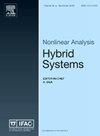Timed initial-state detectability of discrete-event systems by algebraic method
IF 3.7
2区 计算机科学
Q2 AUTOMATION & CONTROL SYSTEMS
引用次数: 0
Abstract
In this paper, we address the problem of initial-state detectability (I-detectability) for timed discrete-event systems modeled by time-interval automata (TIAs). An I-observer, defined over a timed event set, is developed to check both strong and weak I-detectability. Additionally, an I-detector structure is designed as an alternative method for verifying strong I-detectability, which is more efficient than the I-observer in certain cases. In addition, we are the first to formally define the concepts of strong and weak timed initial-state detectability (-I-detectability) within the framework of timed discrete-event systems. Specifically, I-detectability necessitates that the initial state of a system can be detected after a finite number of observations. From another perspective, -I-detectability entails that the initial state can be ascertained after a delay of time units. Under the assumption that every cycle in the TIA has strictly positive weight, we establish that a TIA is -I-detectable if and only if it satisfies the condition of being I-detectable. Finally, we introduce an algebraic method to compute the upper bound of time that needs to elapse before the initial state can be determined in an I-detectable TIA.
用代数方法研究离散事件系统的时间初始状态可检测性
本文研究了由时间间隔自动机(TIAs)建模的时间离散事件系统的初始状态可检测性问题。在一个定时事件集上定义了一个i -观测器,用于检查强和弱i -可探测性。此外,设计了一个i检测器结构作为验证强i可探测性的替代方法,在某些情况下,它比i观察者更有效。此外,我们首次在时间离散事件系统的框架内正式定义了强和弱时间初始状态可探测性(t - i -可探测性)的概念。具体来说,i -可探测性要求系统的初始状态可以在有限次观测后被探测到。从另一个角度来看,T- i可探测性意味着在延迟T个时间单位后可以确定初始状态。在假定TIA中的每个周期都有严格正权的前提下,我们建立了TIA是t - i可检测的当且仅当它满足i可检测的条件。最后,我们引入了一种代数方法来计算在i可检测的TIA中确定初始状态所需时间的上界。
本文章由计算机程序翻译,如有差异,请以英文原文为准。
求助全文
约1分钟内获得全文
求助全文
来源期刊

Nonlinear Analysis-Hybrid Systems
AUTOMATION & CONTROL SYSTEMS-MATHEMATICS, APPLIED
CiteScore
8.30
自引率
9.50%
发文量
65
审稿时长
>12 weeks
期刊介绍:
Nonlinear Analysis: Hybrid Systems welcomes all important research and expository papers in any discipline. Papers that are principally concerned with the theory of hybrid systems should contain significant results indicating relevant applications. Papers that emphasize applications should consist of important real world models and illuminating techniques. Papers that interrelate various aspects of hybrid systems will be most welcome.
 求助内容:
求助内容: 应助结果提醒方式:
应助结果提醒方式:


